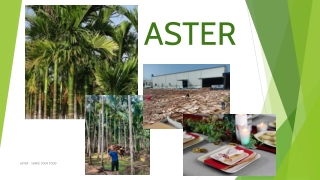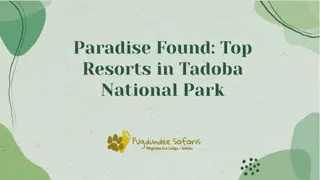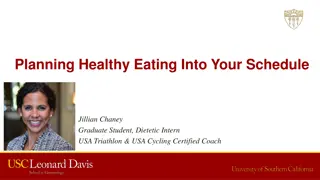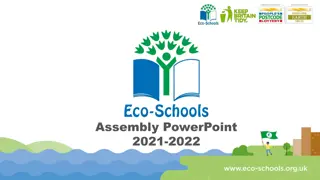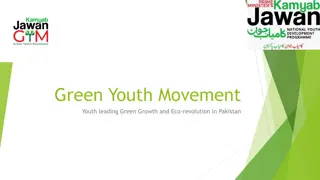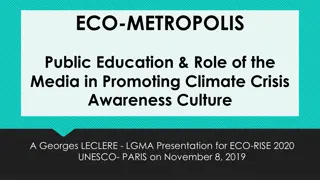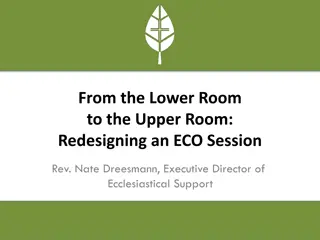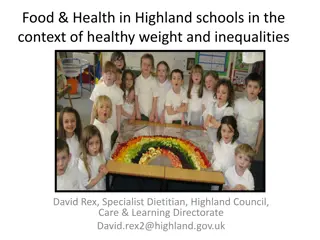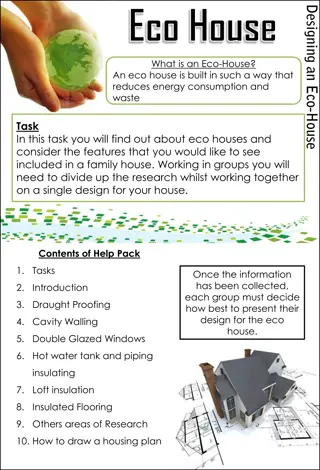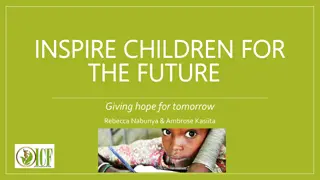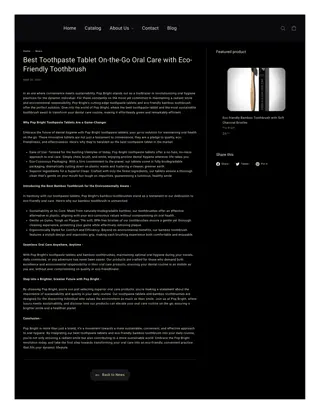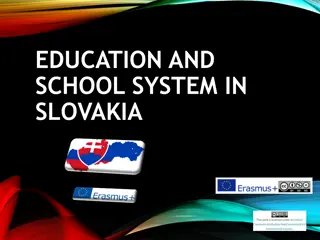Eco-Healthy Schools Project: Supporting Children for Health
This project focuses on creating eco-healthy schools by involving children in various activities such as collaborative platform development, case studies, and outcome assessment. The initiative aims to promote environmental awareness and health among children through hands-on learning experiences and dissemination of project results.
Download Presentation

Please find below an Image/Link to download the presentation.
The content on the website is provided AS IS for your information and personal use only. It may not be sold, licensed, or shared on other websites without obtaining consent from the author.If you encounter any issues during the download, it is possible that the publisher has removed the file from their server.
You are allowed to download the files provided on this website for personal or commercial use, subject to the condition that they are used lawfully. All files are the property of their respective owners.
The content on the website is provided AS IS for your information and personal use only. It may not be sold, licensed, or shared on other websites without obtaining consent from the author.
E N D
Presentation Transcript
Eco Eco- -sensors4Health sensors4Health Eco-sensors for health: Supporting children to create eco-healthy schools
CRONOGRAMA 2017 2018 2019 September Duration (months) November November December December N February February Institution Responsibl e October October January January August In cio Fim March Activit y n March Institutions involved June April April May July Activity denomination people/ month 1 Coordination and administration 2,15 IPL IPL, IPV 18 2017-10-12 2019-04-11 Design and preparation of the case studies IPL, IPV, CV 2 7,79 IPL 8 2017-10-12 2018-06-11 Development of the collaborative platform 3 1,53 IPL IPL, IPV 7 2017-11-12 2018-06-11 IPL, IPV, CMV 4 Implementation of the case studies 8,6 IPL * * * 5 2018-09-01 2019-01-31 Assessment of the use of the collaborative platform and of children learning outcomes 5 5,02 IPL IPL, IPV 7 2018-09-01 2019-03-31 Dissemination of the project s results IPL, IPV, CV, MV 6 9,18 IPL 13 2018-03-12 2019-04-11 * School holidays M1.1 M1.2 M2 M3 Milestones M1 Project collaborative platform launching (M1.1) and beginning of the case studies (M1.2) M2 Assessment report M3 Dissemination toolkit Acronyms IPL Instituto Polit cnico de Lisboa Instituto Polit cnico de Viseu Ci ncia Viva C mara Munic pio de Viseu IPV CV CMV
Results - The project platform/portal which will integrate information about the project - objectives; activities; results of the school activities; and publications; - 1 book, 3 papers in international journals and 1 paper in a national journal; - 3 communications and publications in international conferences; - 2 workshops in national conferences; - 1 workshop in an international conference; - 6 MSc dissertations; - 2 participatory workshops to prepare school interventions (in collaboration with activity 2); - 2 b-learning courses will be designed and implemented to disseminate the project s results in Lisboa and Center region; - 1 final workshop with teachers in Pavilh o do Conhecimento, CV Ag ncia Nacional para a Cultura Cient fica e Tecnol gica (CV);
Atividade 1 - Coordination and administration Goals - To ensure the correct project execution, accordingly to the proposal; - To manage the communication and collaboration in the research team, and the integration of the research activities, providing for internal communication and information flow throughout the whole project period; - To manage the project resources; - To ensure effective external communication; - To provide for timely completion of reports and deliverables Results - A collaborative coordination area in the website; - Quality and adequate timing of the execution of the project; - Two project reports, one in each civil year. Maria Jo o Silva; Susana Viegas; Cristina Azevedo Gomes
Atividade 2 - Design and preparation of the case studies Team members Maria Jo o Silva Ana Caseiro Ant nio Almeida Bianor Valente Carlos Luz Nuno Melo Margarida Rodrigues Clarisse Nunes Vitor Manteigas Cristina Azevedo Gomes Anabela Novais Maria Isabel Abrantes Alexandra Souza Cl udia Chaves Ana Rita Alves
Atividade 2 - Design and preparation of the case studies Methods - Development of a preliminary assessment of the environmental health in each school; - Definition of the two participant classes in each school (one is a control class), and the participant students of the teachers training schools of IPL and IPV; - Creation of a work plan for each school, based on the assessment, and on the relations of the school environment systems (urban, maritime and rural); - To prepare a toolkit for each school, integrating the collaborative platform user guide, the eco-sensors and tablets, the templates of collaborative documents to support the school environmental health actions, the children pre and posttests, and other tools to collect evidence recordings; - Preparation of two participatory Workshop (one in Lisboa and another in Viseu) to work with the participant students of the teachers training schools of IPL and IPV, and the participant school teachers on research objectives, school toolkit, and activities to be implemented with children. Results - A preliminary assessment of the environmental health in each school; - A work plan for each school, including one or more thematic challenges and the topics to be explored in each case; - A toolkit for each school; - One research team meeting; - Two participatory Workshops (in Lisboa and Viseu) to participant students of the teachers training schools of IPL and IPV, and to the participant school teachers.
Atividade 3 - Development of the collaborative platform Methods - Definition of the requirements and cases of use of the collaborative platform; - Implementation of a rapid prototype; - Implementation of the collaborative platform; - Implementation of the collaborative platform user guide. Results - A collaborative platform to support school communities of practice, and specifically children, in using sensors data in environmental health decision making processes, which will include: i) A web portal that will present news, a newsletter, a workspace for each school (with collaborative docs and blog), and that will allow quantitative queries of the sensors data and map searches of the children s posts; ii) A database that will manage the children s posts, which could integrate location and time data, text, sounds, images and videos together with the sensors data, and communicated through mobile devices, such as mobile phones and tablets. - One research team meeting. Maria Jo o Silva; Cristina Azevedo Gomes; Pedro Rito
Atividade 4 - Implementation of the case studies Team members Ana Caseiro Ant nio Almeida Bianor Valente Carlos Luz Nuno Melo Margarida Rodrigues Clarisse Nunes Vitor Manteigas Anabela Novais Maria Isabel Abrantes Nuno Almeida Grant Holder 1
Atividade 4 - Implementation of the case studies Methods - In each of the three schools, the school teams (participant school children and teachers), will work as communities of practice, with the support of the project elements, and will use of the work plan, the toolkit and the collaborative platform, developed in activity 2 and 3, to implement the three case studies; - Besides the children s posts and the collaborative documents that will be recorded by the collaborative platform, selected tasks of the school communities of practice will be audio recorded and organized in multimodal narratives. A pre and posttest will be applied in all the participant classes, including the control ones. These data will be used in activity 5 (Assessment of the use of the collaborative platform and of children learning outcomes). Results - Data produced by children, using the eco-sensors and the mobile devices; - Collaborative documents produced by the school communities of practice; - Two research team meetings; - Results of the pre and posttests applied to all the children, including the ones of each control class of each school.
Atividade 5 - Assessment of the use of the collaborative platform and of children learning outcomes Team members Maria Jo o Silva Ana Caseiro Ant nio Almeida Bianor Valente Margarida Rodrigues Carla Viegas Vitor Manteigas Cristina Azevedo Gomes Cl udia Chaves Pedro Rito Grant Holder 1
Atividade 5 - Assessment of the use of the collaborative platform and of children learning outcomes Methods - The assessment of the adequacy of the collaborative platform to project central goal is developed through the assessment of children s environmental health actions and learning outcomes; - An assessment of the environmental health in each school after the case studies; - A qualitative analysis of the data collected in activity 4 (Implementation of the case studies) - such as children s posts, collaborative documents, results of the pre and posttests, and audio recordings of children s tasks - will be performed to identify children s epistemic practices, such as seek out, understand, evaluate, and use environmental health information to make informed choices, reduce health risks, improve quality of life and protect the environment; - A quantitative analysis will be performed to the results of the pre and posttests applied in all the participant classes, including the control ones; - The design of the first draft of a dissemination toolkit to be used in the future by other schools, based on the toolkit developed in activity 2, and that will evolve to a dissemination toolkit in the activity 6. Results - Data produced by children, using the eco-sensors and the mobile devices; - Collaborative documents produced by the school communities of practice; - Two research team meetings; - Results of the pre and posttests applied to all the children, including the ones of each control class of each school.
Atividade 6 - Dissemination of the project's results Results - The project platform/portal which will integrate information about the project - objectives; activities; results of the school activities; and publications; - 1 book, 3 papers in international journals and 1 paper in a national journal; - 3 communications and publications in international conferences; - 2 workshops in national conferences; - 1 workshop in an international conference; - 6 MSc dissertations; - 2 participatory workshops to prepare school interventions (in collaboration with activity 2); - 2 b-learning courses will be designed and implemented to disseminate the project s results in Lisboa and Center region; - 1 final workshop with teachers in Pavilh o do Conhecimento, CV Ag ncia Nacional para a Cultura Cient fica e Tecnol gica (CV); - 1 final International Workshop to disseminate and receive experts? feedback on the project s results; - 1 dissemination toolkit.


